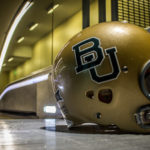Fifty years after the assassination of Martin Luther King Jr., Theo Brown still vividly remembers the events of that evening and the days that followed—as well as how they shaped his life as an advocate for racial reconciliation, peace and social justice.
On April 4, 1968, Brown was eight weeks shy of graduation from Baylor University and working as youth director at Seventh and James Baptist Church in Waco. About 5:30 p.m., he was at church making phone calls to Baylor students, trying to enlist chaperones for an upcoming youth activity.
One young woman he called asked if he had heard the news: Martin Luther King Jr. had been shot in Memphis. Brown recalled her saying she didn’t really care much about him, but she was worried about the rioting and violence that might follow.
“Her insensitive comment irritated me and led me to mumble something about how much I loved King before I hung up and ran into the pastor’s office to turn on the radio,” Brown wrote recently in a personal remembrance he sent to fellow Baylor alumni.
“I was as shocked and stunned as I had ever been in my life as I paced in the pastor’s office and listened to the news bulletins about King having been shot. … Over the past year and a half, King had become my hero and my inspiration, and, more than anything, I had decided I wanted to model my life after his. For several years, I had been planning to be a Baptist preacher, and he had inspired me to want to be one that worked for justice and racial reconciliation.”
‘Sad, lonely and lost’
Within a short time, Brown heard the announcement King had been pronounced dead of his wounds.
“I felt indescribably sad, lonely and lost and needed to do something with my grief,” Brown recalled.
He noted his sense of loneliness was compounded by the absence of his roommate, Paul Malone, who shared his admiration for King but was out of town.

“It was Paul who had taken the lead in mentoring kids in the black neighborhood south of LaSalle (Avenue) and Paul who had come up with the idea of us moving into that neighborhood during our final semester at Baylor,” Brown wrote. “He was my soul mate in the spiritual transformation King had created in our lives, and I ached that I couldn’t talk with him.”
Sign up for our weekly edition and get all our headlines in your inbox on Thursdays
Brown began to walk around campus and eventually sat by a fountain and wept.
“As I sat there, I had the first stirrings of a strong feeling that would grow throughout the next several days—the need to do something, to take some action,” he recalled.
In a notebook, he began writing a two-page letter to Coretta Scott King.
“I poured out my sadness and the details of how much I had been inspired by her husband,” he said. “I wrote how he had become my hero and told her that I and many others would carry on his work. I pledged to dedicate my life to do what I could to advance King’s teachings.”
Memorial meal, memorial service
Wanting to connect with like-minded students, he walked to the apartment of two friends, Steve Ober and Tim Barrett. Within a short time, about a dozen students assembled in the apartment, watching televised news reports about King’s assassination. After an hour or so, Ober suggested they observe the Lord’s Supper together.
“I was a bit surprised by that, since I had never thought of the Lord’s Supper as something you could do anywhere outside of a Baptist church,” Brown wrote.
With no grape juice or unleavened bread available, the students used water and white bread.
After sharing communion and praying together, they began to talk about organizing a memorial service for King the next morning near the Baylor campus. One student made a late-night call to Bob Weissinger, associate pastor at Seventh and James Baptist Church, and received permission to use a room at the church. Another contacted the Baylor Lariat, and its editors agreed to include a notice on the front page of the next day’s newspaper. Yet another student designed a handbill to copy and distribute on campus, promoting the event.
The next morning, about 50 students arrived at the church for the memorial service. Someone read 1 Corinthians 13, and then Brown and another student took turns reading from King’s Letter from Birmingham Jail. A soloist sang “I Know that my Redeemer Liveth” from Handel’s Messiah. At the send of the service, students linked arms and sang “We Shall Overcome.”
Driving through the night to Memphis
After Sunday evening worship, Brown went to eat with a fellow student, Eric Morris, to discuss what else they could do to honor King. As they talked about the sanitation workers’ strike in Memphis, they determined they should join the striking workers in their march.

They spent a couple of hours contacting other friends, loaded two cars to capacity and began a 550-mile trip to Memphis. The students took turns driving through the night, and they arrived about 8:30 on Monday morning. After breakfast, they went to the assembly point for the march.
“We could see people streaming tougher from many directions and followed the movement toward the back of the line, so we could join the march that had just started,” Brown recalled. “As we approached, we were given signs to carry, and most of us ended up with the now-iconic signs that the sanitation workers had been carrying during their long battle with the city that said, ‘I Am A Man.’”
Eventually, they reached a park where a rally was scheduled.
“We arrived just in time to hear Coretta Scott King, and her wise and courageous speech left us wondering where she got the strength to keep going,” Brown recalled.
A speech by Ralph Abernathy followed. After about an hour, the rally ended, and the students returned to their cars and drove back to Waco.
“We were exhausted but also elated by the experience of marching for Dr. King in Memphis and being a part of history,” Brown wrote.
Hopeful sign
When the group arrived in Waco, they learned a memorial service for King was in progress at Minglewood Bowl, a popular gathering spot on the Baylor campus.
“We hurried over to the program and were surprised—and elated—to see a large crowd,” Brown recalled. “The service was ending, and at least 200 to 300 people from every part of the Baylor community were standing and singing, ‘We Shall Overcome.’
“Black maintenance workers and white faculty members were linking arms with students and the maid who cleaned their rooms. I had sung ‘We Shall Overcome’ several times during the past few days, but this was the most meaningful.”
Brown saw it as a hopeful sign of “a new Baylor that would emerge in the years to come.”
“I never mailed the letter to Coretta Scott King that I wrote on April 4, 1968, but it may have been the most important letter I ever wrote,” Brown said, adding he never forgot the commitments he made in the letter.
“After Baylor, those commitments led me to two years of teaching in West Africa (as a Southern Baptist Journeyman missionary), divinity school (at Duke University) and then a life spent as an organizer for groups working for social justice,” he wrote.
Brown has worked four decades as an organizer, facilitator and trainer for organizations focused on peace, justice and reconciliation, most recently with Public Engagement Associates.
“Through it all, I realize that what I learned about Martin Luther King Jr. while at Baylor—and the intense experiences I had after his murder—shaped my life more than anything else I had ever done,” he said.














We seek to connect God’s story and God’s people around the world. To learn more about God’s story, click here.
Send comments and feedback to Eric Black, our editor. For comments to be published, please specify “letter to the editor.” Maximum length for publication is 300 words.